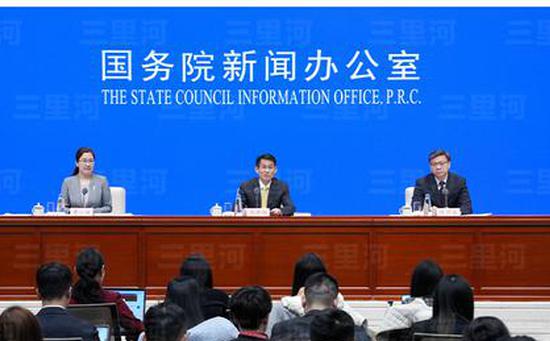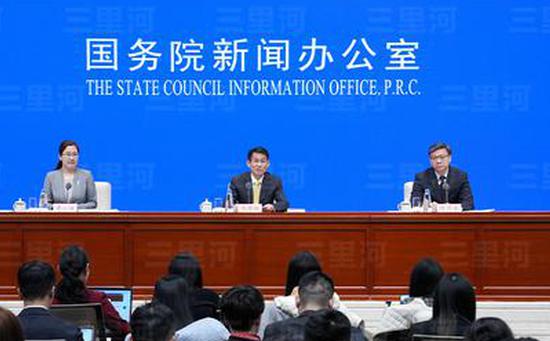Government work report reveals new direction in China's real estate policy

The State Council Information Office of China holds a press briefing in Beijing on March 5. (Photo:China News Service/Zhang Xiangyi)
(ECNS) -- China’s 2025 government work report has for the first time emphasized the need to stabilize the real estate markets within its overall policy framework, according to the State Council Information Office on Wednesday.
Chen Changsheng, a member of the drafting group for the government work report and deputy director of the State Council Research Office, highlighted some key shifts in China's real estate policy at a press briefing.
New directives in the report provides important insights into the policy direction for 2025, particularly in the context of real estate. These changes are expected to guide future actions aimed at stabilizing the housing market and ensuring more sustainable economic growth.
China strengthens measures to prevent risks in housing market
Stabilizing the real estate market was first highlighted in the meeting held by the Political Bureau of the Communist Party of China (CPC) Central Committee in December 2024. Now, it has been incorporated into the overall objectives of the government work report 2025 .
To achieve this goal, the report emphasizes leveraging the real estate financing coordination mechanism to ensure timely delivery of housing projects and effectively prevent debt defaults by real estate companies.
Li Yunze, head of the National Financial Regulatory Administration, stated on the same day that the real estate financing coordination mechanism has so far approved over 6 trillion yuan ($XXX ) in loans, covering more than 15 million housing units completed and under-construction.
He highlighted that China will extend the white list of eligible projects and provide more financing support to ensure housing deliveries.
Chen Wenjing, director of policy research at China Index Academy, said the financing coordination mechanism plays a crucial role in ensuring housing deliveries. Continued efforts in this area will accelerate supply-side recovery, boost homebuyer confidence, and contribute to market stabilization, he added.
China will ease housing restrictions, expand urban redevelopment to boost demand
China will introduce city-specific policies on adjusting or reducing property transaction restrictions, while intensifying efforts to redevelop urban villages and renovate old and dilapidated houses, according to the report. These measures aim to fully tap into potential demand for first homes and better housing.
The phrase "city-specific policies on adjusting or reducing property transaction restrictions" is a newly introduced concept in the report.
Yan Yuejin, deputy director of the Shanghai E-House Real Estate Research Institute, stated that this new concept suggests potential adjustments and optimizations in local housing policies, including the easing of purchase restrictions. While major cities with unique conditions may further fine-tune policies, a complete removal of restrictions is unlikely, Yan explained.
The report also underscores the importance of improving housing conditions.
Zhang Bo, director of the 58 Anjuke Institute, said that by upgrading housing improvement and expanding urban renewal projects, China could stimulate broader economic activity.
Chen stressed the necessity to encourage more first-time buyers and those seeking better housing to enter the market.
He also highlighted measures such as increasing home purchase subsidies, lowering mortgage rates, and reducing transaction costs would be crucial in unlocking demand.
China will optimize land use, boost acquisition of housing stock
China will optimize urban spatial structures and land use practices and properly control the supply of new land for real estate projects, according to the report.
It states that efforts will focus on existing land resources as well as commercial and office properties to facilitate the purchase of commodity housing stock. Local governments will be granted greater power to determine the types of entities that can make such purchases, the prices of such properties, and the purposes for which they will be used.
In 2025, China plans to allocate 4.4 trillion yuan in local government special-purpose bonds, an increase of 500 billion yuan over last year. The funds will primarily be used for construction investment, land acquisition and reserve, purchase of commodity housing stock, and settlement of overdue payments owed by local governments to enterprises.
Zhang believes that in 2025, local governments will be able to better regulate the supply of commercial housing, effectively increase the supply of affordable housing, and enhance market efficiency.
China will enhance housing standards, promote quality homes
To meet people’s demand for high-quality housing, China will improve the standards and regulations on building quality homes that are safe, comfortable, eco-friendly, and smart, according to the report.
The term "quality homes" appears in the report for the first time, reflecting China's shift from focusing on housing availability to improving housing quality.
Since the concept was first introduced in June 2023, the Ministry of Housing and Urban-Rural Development of China, along with other departments, has revised the Residential Project Specification, raising requirements for building quality, floor height, sound insulation, and lighting.
According to Chen, the term "improving the standards" suggests that more cities will introduce localized policies tailored to their specific housing needs.

